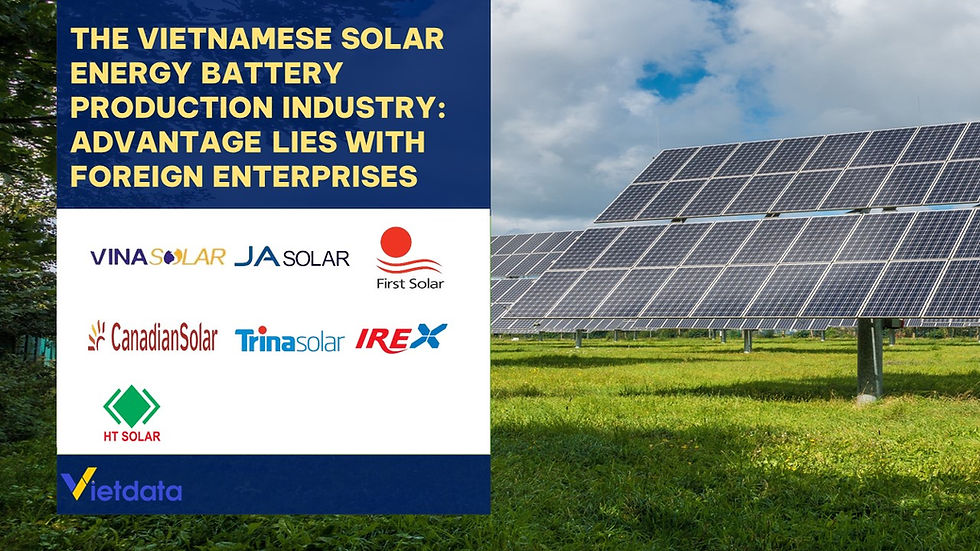Many Chinese solar panel companies in Vietnam suddenly stopped production?
- duyenthu.vietdata
- Jun 10, 2024
- 3 min read
Two of the world's largest solar panel manufacturers said they will suspend some production in Southeast Asia, following a US tariff exemption on solar panels from several countries Southeast Asia expires.
Factories temporarily stopped operating
China's Longi Green Energy Technology said on June 8 that it had temporarily suspended production at a battery factory in Vietnam, while Trinasolar said on June 7 that facilities in Thailand and Vietnam will "start the maintenance period".
According to SCMP, companies are mainly concerned about staying or leaving amid the US's move to block tariff evasion.
Companies temporarily halted production in the name of "upgrading facilities" or "maintenance", or sent workers on leave after the US Department of Commerce opened an anti-dumping and anti-subsidy investigation into crystalline silicon photovoltaic cells from Cambodia, Malaysia, Thailand and Vietnam.
The US made the move after domestic solar companies alleged that China was trying to avoid tariffs by shifting production to Southeast Asian countries.
Analysts say the investigations highlight the challenges facing Chinese manufacturers and the importance of finding alternative markets to the European Union or other Western countries. can follow.
"If China doesn't have the US market, it should capture demand in the Middle East or other major developing countries," said Terence Chong Tai-leung, associate professor of economics at the University of Hong Kong.
According to a report from international law firm Kilpatrick, a 200% anti-dumping and anti-subsidy tax exemption order was issued by the US in 2022 for some solar batteries and modules from Cambodia, Malaysia, and Thailand. Lan and Vietnam expired on June 7. Major Chinese manufacturers - currently assembling solar and battery products in the four countries mentioned above for export to the US - said they are adjusting production plans to cope with the risk. Stopped mass production.
Longi, one of China's largest solar companies that operates factories in Malaysia and Vietnam, said earlier this week that the production adjustment was due to planned factory upgrades, without specifying Does this adjustment protect the rights and interests of employees?
America's move
Jiangsu-based Trina Solar also said factories in Thailand and Vietnam were shut down for "routine maintenance".
In a statement to SCMP, the company said products from the factory are supplied to the US market and that the company is no stranger to policy changes and market fluctuations.
"This is not the first time and we will adjust production plans accordingly," the company said.
More than 20 Chinese photovoltaic companies have production bases across Southeast Asia as the region attracts investors due to its cheap production costs, proximity to China and exemption from US tariffs.
"The US is clearly determined to strengthen its domestic solar industry and supply chain, so the question is whether we should close factories in Southeast Asia or keep them there as a backup." ", Li Zhenguo - founder of Longi company - said in an interview with the press.
Several Chinese manufacturers, including Trina Solar, are accelerating construction of new factories in the US.
Shanghai-based Jinko Solar has built factories in the US with a total output of 2 gigawatts and is applying for US government subsidies after the Biden administration announced it would distribute financial support for the products. Solar energy products are produced domestically.
Liu Yiyang, deputy director of the China Photovoltaic Industry Association, told a forum in Beijing last month that US moves against exports from Southeast Asia were a tactic to block what they call it a "loophole" in holding back China's new energy sectors.
The US and EU have been keeping an eye on China's large-scale production in new energy industries and have launched a series of investigations and countermeasures. In addition, the US and EU also criticized China's electric vehicles and lithium batteries in an effort to protect local industries.
(An ninh Tien te)




شيخ روحاني
رقم شيخ روحاني
شيخ روحاني لجلب الحبيب
الشيخ الروحاني
الشيخ الروحاني
شيخ روحاني سعودي
رقم شيخ روحاني
شيخ روحاني مضمون
Berlinintim
Berlin Intim
جلب الحبيب
https://www.eljnoub.com/
https://hurenberlin.com/